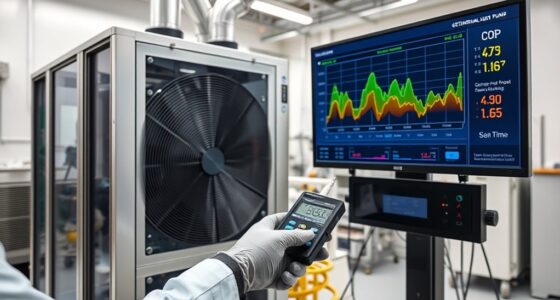Many of us are familiar with geothermal heat pumps, but do we truly understand their operation? This article will explore the intriguing science that powers these systems.
From understanding geothermal heat transfer to exploring the components that make up a geothermal heat pump, we’ll break it all down for you.
Get ready to discover how these pumps utilize the Earth’s thermal energy to provide efficient heating and cooling.
Get ready to master the art of geothermal heat pump function.

Key Takeaways
- Geothermal heat pump installation involves three main components: heat pump unit, ground loop system, and distribution system.
- Geothermal heat transfer involves two main mechanisms: conduction and convection.
- Geothermal heating achieves high efficiency by utilizing natural heat transfer processes in the earth’s subsurface.
- Geothermal heat pumps require less energy compared to traditional systems and have minimal environmental impact.
The Basics of Geothermal Heat Pumps
Let’s dive into the basics of how geothermal heat pumps work.
Geothermal heat pump installation involves three main components: the heat pump unit, the ground loop system, and the distribution system.
The heat pump unit transfers heat between the ground and the indoor air. It consists of a compressor, a heat exchanger, and a refrigerant.
The ground loop system circulates a fluid, usually a mixture of water and antifreeze, through pipes buried in the ground. This fluid absorbs heat from the ground during the winter and releases it during the summer.

The distribution system distributes the heated or cooled air throughout the building.
Regular maintenance is crucial to ensure optimal performance and efficiency. This includes checking the refrigerant levels, cleaning or replacing air filters, and inspecting the ground loop system for any leaks.
Troubleshooting common issues such as insufficient heating or cooling can involve checking the thermostat settings, ensuring proper airflow, and inspecting the ground loop system for any faults.
The Science Behind Geothermal Heat Transfer
When it comes to the science behind geothermal heat transfer, there are two main mechanisms at play: conduction and convection.

Conduction involves the transfer of heat through direct contact between materials, such as the ground and the heat pump’s refrigerant.
Convection, on the other hand, occurs when heat is transferred through the movement of fluids, like the circulation of water in a geothermal loop system.
Understanding these heat transfer mechanisms is crucial for maximizing the efficiency of geothermal heating systems.
Heat Transfer Mechanisms
We use the principles of heat transfer to understand how geothermal heat pumps function. Heat transfer mechanisms play a crucial role in the extraction and utilization of geothermal energy sources. There are three main mechanisms involved: conduction, convection, and radiation.

Conduction is the transfer of heat through direct contact between materials. In geothermal heat pumps, this occurs when heat is transferred from the ground to the heat pump system through the earth loop. The loop, buried underground, absorbs heat from the earth through conduction.
Convection is the transfer of heat through the movement of fluids or gases. In geothermal systems, convection occurs when the fluid or refrigerant circulates through the earth loop, absorbing heat from the ground and transferring it to the heat pump.
Radiation is the transfer of heat through electromagnetic waves. In geothermal heat pumps, radiation isn’t a significant factor since the heat transfer occurs mainly through conduction and convection.
Understanding these heat transfer mechanisms is essential in designing and optimizing geothermal heat pump systems for efficient and sustainable heating and cooling.

Efficiency of Geothermal Heating
Geothermal heating achieves high efficiency by utilizing the natural heat transfer processes occurring in the earth’s subsurface. This efficient heating system takes advantage of the constant temperature of the ground, which remains relatively stable throughout the year.
Here are three key factors that contribute to the efficiency of geothermal heating:
-
Proper geothermal heat pump installation: Ensuring that the heat pump is correctly sized and installed is crucial for optimal performance. An experienced professional will take into account factors such as the size of the property, insulation, and local climate conditions.
-
Regular geothermal heat pump maintenance: Regular maintenance checks and tune-ups are essential to keep the system running efficiently. This includes inspecting and cleaning the heat exchanger, checking refrigerant levels, and ensuring proper airflow.

-
Efficient geothermal heat transfer: The heat transfer process in a geothermal system relies on the movement of heat from the earth to the heat pump, and then to the building. This process is highly efficient due to the constant temperature of the ground, which allows for more efficient heat exchange.
Understanding the efficiency of geothermal heating sets the stage for exploring the intricacies of geothermal heat exchange systems.
Understanding Geothermal Heat Exchange Systems
Our homes rely on geothermal heat exchange systems to efficiently transfer heat from the ground to our living spaces.
Geothermal heat exchange systems utilize a closed-loop system that consists of pipes buried underground. These pipes contain a heat transfer fluid, such as water or antifreeze, which absorbs heat from the earth and carries it into the home.

The heat exchange process takes place in two stages: the heat absorption stage and the heat release stage.
During the absorption stage, the fluid absorbs heat from the ground through the pipes. This heat is then transferred to the heat pump, which extracts the heat and distributes it throughout the home.
The heat release stage involves releasing any excess heat back into the ground to maintain a constant temperature.
The benefits of geothermal heat exchange systems include reduced energy consumption, lower utility bills, and minimal environmental impact.

Installation of these systems involves drilling boreholes or trenches to bury the pipes and connecting them to the heat pump.
Exploring Geothermal Heat Pump Components
What components are involved in a geothermal heat pump system?
-
Heat Pump Unit: This is the heart of the system, responsible for transferring heat between the indoor space and the ground. It consists of a compressor, condenser, and evaporator.
-
Ground Loop: This is a series of pipes buried underground that circulate a fluid, typically a mixture of water and antifreeze. The ground loop absorbs heat from the earth during the heating mode and releases it during the cooling mode.

-
Distribution System: This system distributes the heated or cooled air throughout the building using ductwork or radiant heating/cooling systems.
Understanding these components is essential for geothermal heat pump maintenance and ensuring optimal system performance.
Now, let’s explore how geothermal heat pumps utilize the earth’s thermal energy.
How Geothermal Heat Pumps Utilize Earth’s Thermal Energy
Geothermal heat pumps utilize the earth’s thermal energy to provide efficient heating and cooling solutions.

By tapping into the stable temperatures below the Earth’s surface, these systems can extract heat during the winter and transfer it indoors, while in the summer, they can remove heat from the indoor air and transfer it back into the ground.
This process not only ensures comfortable indoor temperatures but also results in significant cost savings, as geothermal heat pumps require less energy to operate compared to traditional heating and cooling systems.
Efficiency of Geothermal Heat Pumps
Although we often think of geothermal heat pumps as a relatively new technology, they’ve actually been utilized for centuries to efficiently harness the thermal energy of the Earth. These systems offer exceptional efficiency due to their ability to transfer heat from the ground to a building, or vice versa, using a small amount of electricity.
Here are three key factors that contribute to the efficiency of geothermal heat pumps:

-
Efficient Installation: Proper geothermal heat pump installation ensures that the system can effectively extract and transfer thermal energy from the ground. This includes conducting a thorough analysis of the site and selecting the appropriate heat exchanger design.
-
Regular Maintenance: Regular maintenance of geothermal heat pumps is crucial to ensure optimal performance and efficiency. This includes checking and cleaning the heat exchanger, inspecting the refrigerant levels, and monitoring the overall system operation.
-
Advanced Technology: Modern geothermal heat pumps incorporate advanced technology, such as variable-speed compressors and intelligent control systems, which further enhance their efficiency and performance.
Cost Savings With Geothermal
Our cost savings with geothermal heat pumps are achieved by utilizing Earth’s thermal energy and implementing efficient installation and maintenance practices. Geothermal heat pump installation involves harnessing the naturally occurring heat stored in the Earth to provide heating and cooling for buildings.

This renewable energy source allows us to tap into the constant temperature of the ground, which remains relatively stable throughout the year. By utilizing this thermal energy, geothermal heat pumps can operate more efficiently compared to traditional heating and cooling systems. This increased efficiency leads to significant cost savings in energy consumption.
Geothermal energy savings can be substantial, with savings of up to 70% on heating costs and 50% on cooling costs compared to conventional systems. Additionally, geothermal heat pumps require minimal maintenance, further reducing long-term costs.
The Benefits and Efficiency of Geothermal Heating and Cooling
Why should we consider using geothermal heat pumps for heating and cooling? There are several advantages to using geothermal heat pumps that make them a compelling choice for environmentally conscious homeowners.
-
Energy Efficiency: Geothermal heat pumps are incredibly efficient, as they transfer heat to and from the ground, which remains at a relatively constant temperature throughout the year. This means that they require less energy to operate compared to traditional heating and cooling systems, leading to significant cost savings over time.

-
Environmental Impact: Geothermal heating and cooling systems have a minimal environmental impact. They don’t rely on fossil fuels and produce no greenhouse gas emissions, reducing our carbon footprint and helping to combat climate change.
-
Long Lifespan: Geothermal heat pumps have a longer lifespan compared to conventional systems. With proper maintenance, they can last for 20-25 years, providing reliable heating and cooling for an extended period.
Frequently Asked Questions
What Are the Maintenance Requirements for Geothermal Heat Pumps?
Maintenance requirements for geothermal heat pumps include regular filter cleaning or replacement, annual inspections by a professional technician, and periodic checks of the system’s performance. These measures ensure optimal energy efficiency and prevent any potential issues from arising.
How Long Does a Geothermal Heat Pump System Typically Last?
Geothermal heat pump systems typically last for a long time, providing us with the assurance of their longevity. Their lifespan can range from 20 to 50 years, depending on various factors such as maintenance, usage, and quality of installation.

Can Geothermal Heat Pumps Be Installed in All Types of Homes?
Yes, geothermal heat pumps can be installed in all types of homes. They offer high efficiency and numerous benefits, such as reduced energy consumption and lower carbon emissions, making them a popular choice for homeowners looking for sustainable heating and cooling solutions.
Are Geothermal Heat Pumps Noisy?
Geothermal heat pumps are not noisy. They operate quietly, like a gentle hum in the background. In addition to their quiet operation, geothermal heat pumps offer high efficiency and numerous benefits for homeowners.
Do Geothermal Heat Pumps Require a Backup Heating System in Colder Climates?
In colder climates, geothermal heat pumps may require backup heating options to meet the increased demand for warmth. However, their energy efficiency is still impressive, making them a viable heating solution.
Conclusion
In conclusion, geothermal heat pumps are an incredibly efficient and sustainable heating and cooling solution. By harnessing the Earth’s thermal energy, these systems offer substantial benefits, including lower energy consumption and reduced carbon emissions.

With their advanced technology and smart design, geothermal heat pumps are revolutionizing the way we heat and cool our homes. They’re truly the superheroes of HVAC systems, providing unparalleled comfort and environmental friendliness.









